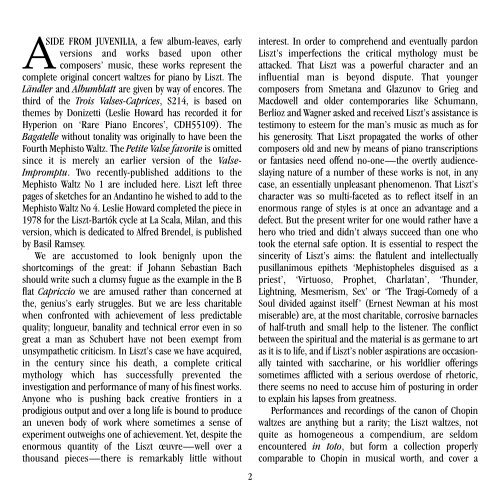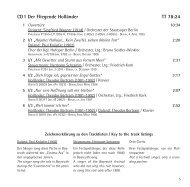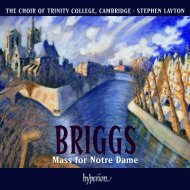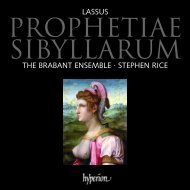- Page 1 and 2:
THE COMPLETE LISZT PIANO MUSIC INTR
- Page 3 and 4:
The Complete Liszt Piano Music CONT
- Page 5 and 6:
Leslie Howard Leslie Howard THE PER
- Page 7 and 8:
please refer to CD wallets for more
- Page 9 and 10:
please refer to CD wallets for more
- Page 11 and 12:
please refer to CD wallets for more
- Page 13 and 14:
please refer to CD wallets for more
- Page 15 and 16:
please refer to CD wallets for more
- Page 17 and 18:
please refer to CD wallets for more
- Page 19 and 20:
please refer to CD wallets for more
- Page 21 and 22:
please refer to CD wallets for more
- Page 23 and 24:
please refer to CD wallets for more
- Page 25 and 26:
The Complete Liszt Piano Music INTR
- Page 27 and 28:
The Complete Liszt Piano Music INTR
- Page 29 and 30:
The Complete Liszt Piano Music INTR
- Page 31 and 32:
The Complete Liszt Piano Music INTR
- Page 33 and 34:
L’intégrale de la musique pour p
- Page 35 and 36:
L’intégrale de la musique pour p
- Page 37 and 38:
L’intégrale de la musique pour p
- Page 39 and 40:
L’intégrale de la musique pour p
- Page 41 and 42:
FRANZ LISZT cover of The Graphic, 1
- Page 43 and 44:
Die gesamten Liszt-Klavierwerke EIN
- Page 45 and 46:
Die gesamten Liszt-Klavierwerke EIN
- Page 47 and 48:
Die gesamten Liszt-Klavierwerke EIN
- Page 49 and 50:
Die gesamten Liszt-Klavierwerke EIN
- Page 51 and 52:
REPRODUCTION OF A DAGUERROTYPE OF F
- Page 53 and 54:
La musica per pianoforte INTRODUZIO
- Page 55 and 56:
La musica per pianoforte INTRODUZIO
- Page 57 and 58:
La musica per pianoforte INTRODUZIO
- Page 59 and 60:
La musica per pianoforte INTRODUZIO
- Page 61 and 62:
The Complete Liszt Piano Music INDE
- Page 63 and 64:
ORIGINAL WORKS S30 INDEX BY S NUMBE
- Page 65 and 66:
ORIGINAL WORKS S122 to S132 INDEX B
- Page 67 and 68:
ORIGINAL WORKS S144 to S158 INDEX B
- Page 69 and 70:
ORIGINAL WORKS S163a/1 to S167k IND
- Page 71 and 72:
ORIGINAL WORKS S173 to S181 INDEX B
- Page 73 and 74:
ORIGINAL WORKS S192 to S208 INDEX B
- Page 75 and 76:
ORIGINAL WORKS S234 to S243 INDEX B
- Page 77 and 78:
ORIGINAL WORKS S262 to S350 INDEX B
- Page 79 and 80:
ARRANGEMENTS, FANTASIES, TRANSCRIPT
- Page 81 and 82:
ARRANGEMENTS, FANTASIES, TRANSCRIPT
- Page 83 and 84:
ARRANGEMENTS, FANTASIES, TRANSCRIPT
- Page 85 and 86:
ARRANGEMENTS, FANTASIES, TRANSCRIPT
- Page 87 and 88:
ARRANGEMENTS, FANTASIES, TRANSCRIPT
- Page 89 and 90:
ARRANGEMENTS, FANTASIES, TRANSCRIPT
- Page 91 and 92:
ARRANGEMENTS, FANTASIES, TRANSCRIPT
- Page 93 and 94:
ARRANGEMENTS, FANTASIES, TRANSCRIPT
- Page 95 and 96:
ARRANGEMENTS, FANTASIES, TRANSCRIPT
- Page 97 and 98:
The Complete Liszt Piano Music ALPH
- Page 99 and 100:
The Complete Liszt Piano Music ALPH
- Page 101 and 102:
The Complete Liszt Piano Music ALPH
- Page 103 and 104:
The Complete Liszt Piano Music ALPH
- Page 105 and 106:
The Complete Liszt Piano Music ALPH
- Page 107 and 108:
The Complete Liszt Piano Music ALPH
- Page 109 and 110:
The Complete Liszt Piano Music ALPH
- Page 111 and 112:
The Complete Liszt Piano Music ALPH
- Page 113 and 114:
The Complete Liszt Piano Music ALPH
- Page 115 and 116:
The Complete Liszt Piano Music ALPH
- Page 117 and 118:
The Complete Liszt Piano Music ALPH
- Page 119 and 120:
The Complete Liszt Piano Music ALPH
- Page 121 and 122:
The Complete Liszt Piano Music ALPH
- Page 123 and 124:
The Complete Liszt Piano Music ALPH
- Page 125 and 126:
The Complete Liszt Piano Music ALPH
- Page 127 and 128:
The Complete Liszt Piano Music ALPH
- Page 129 and 130:
THE Young Liszt LESLIE HOWARD
- Page 131 and 132:
he salvaged to introduce the E flat
- Page 133 and 134:
chorus and orchestra, and received
- Page 135 and 136:
fournissent ses thèmes à la premi
- Page 137 and 138:
épéter, le point auquel le da cap
- Page 139 and 140:
D IE MEISTERSCHAFT DES JUNGEN LISZT
- Page 141 and 142:
vor, sich rückwärts durch den Zyk
- Page 143 and 144:
Sorglosigkeit und schneidender Sch
- Page 145 and 146:
Liszt Douze Grandes Études (1837)
- Page 147 and 148:
3 modern machine, with its ungratef
- Page 149 and 150:
an abandoned continuation of the 18
- Page 151 and 152:
7 se réfère à un « Preludio-Stu
- Page 153 and 154:
abruptement de mètre et devient f
- Page 155 and 156:
gewidmet, und das Anfangsstück ist
- Page 157 and 158:
Jagdmotiv auf dem Fuße folgt, häl
- Page 159 and 160:
Recorded on 17-19 October 1994 Reco
- Page 161 and 162:
Liszt Transcendental Studies Élég
- Page 163 and 164:
transcendental technique arose as a
- Page 165 and 166:
Liszt COMPLETE PAGANINI ÉTUDES Les
- Page 167 and 168:
e a homage to Schumann whom he cons
- Page 169 and 170:
LISZT Intégrale des études de Pag
- Page 171 and 172:
la cinquième étude de Liszt qui e
- Page 173 and 174:
enden Stellen der Einleitung Transp
- Page 175 and 176:
interessant wie ein tropfender Wass
- Page 177 and 178:
Liszt Les Préludes Concert Études
- Page 179 and 180:
event, it is by these Italian title
- Page 181 and 182:
lights are seen through the trees,
- Page 183 and 184:
LISZT Les Préludes A 7 U CENTRE de
- Page 185 and 186:
étudiant et ar ent apologiste de L
- Page 187 and 188:
LISZT Les Préludes S ECHS der wich
- Page 189 and 190:
Präambel eingeschlossen. Lina Rama
- Page 191 and 192:
Liszt THE COMPLETE MUSIC FOR SOLO P
- Page 193 and 194:
T HE ALBUM D’UN VOYAGEUR is the f
- Page 195 and 196:
water-brooks …’). Like ‘Lyon
- Page 197 and 198:
Album d’un voyageur ET AUTRES MOR
- Page 199 and 200:
inhabituelle. Liszt cite un très l
- Page 201 and 202:
Album d’un voyageur & ANDERE STÜ
- Page 203 and 204:
der überarbeiteten Version und ist
- Page 205 and 206:
lich länger. Der Anfang basiert au
- Page 207 and 208:
Album d’un voyageur and other pie
- Page 209 and 210:
A S WITH THE HUNGARIAN RHAPSODIES a
- Page 211 and 212:
work, introducing an inspired and u
- Page 213 and 214:
Le Childe Harold de Byron fournit
- Page 215 and 216:
G LEICH DEN UNGARISCHEN RHAPSODIEN,
- Page 217 and 218:
die meisten Passagen sind vom zweit
- Page 219 and 220:
Liszt Deuxième Année de Pèlerina
- Page 221 and 222:
described as unpublished. Liszt’s
- Page 223 and 224:
1847)—emerges from the depths, mu
- Page 225 and 226:
LISZT Deuxième Année de Pèlerina
- Page 227 and 228:
vérité, et la pièce est, dans so
- Page 229 and 230:
Grato m’è il sonno, e più l’e
- Page 231 and 232:
Knotenpunkt vernehmbar ist, suggeri
- Page 233 and 234:
THE COMPLETE MUSIC FOR SOLO PIANO -
- Page 235 and 236:
L ISZT’S LATE PIANO WORKS are of
- Page 237 and 238:
almost annual triangular trip throu
- Page 239 and 240:
caractérise beaucoup d’écriture
- Page 241 and 242:
L ISZTS SPÄTE KLAVIERWERKE weisen
- Page 243 and 244:
um Jahre voraus war und bewußt ode
- Page 245 and 246:
Liszt THE COMPLETE MUSIC FOR SOLO P
- Page 247 and 248:
T HIS SERIES of recordings of Liszt
- Page 249 and 250:
Liszt THE COMPLETE MUSIC FOR SOLO P
- Page 251 and 252:
Harmonies poétiques et religieuses
- Page 253 and 254:
T HE ABBÉ LISZT has always been a
- Page 255 and 256:
meaning ‘Slavs let us praise the
- Page 257 and 258:
FRANZ LISZT IN 1858 CDA66421/2
- Page 259 and 260:
Early work 1847 1851 1 Élevez-vous
- Page 261 and 262:
described as unfinished but which i
- Page 263 and 264:
augmented triad, and the promised G
- Page 265 and 266:
carnet, qui ne présentent aucun pr
- Page 267 and 268: Liszt tisse ensemble le chant grég
- Page 269 and 270: entschieden hat. Außerdem müssen
- Page 271 and 272: einunddreißig Takten, die andere a
- Page 273 and 274: Liszt THE COMPLETE MUSIC FOR SOLO P
- Page 275 and 276: T HIS THIRD RELEASE in the series o
- Page 277 and 278: CDA66302 THE COMPLETE MUSIC FOR SOL
- Page 279 and 280: RITERS ON LISZT ARE UNANIMOUS in th
- Page 281 and 282: The two Liszt Elegies belong very m
- Page 283 and 284: LESLIE HOWARD Leslie Howard has giv
- Page 285 and 286: OUS LES COMMENTATEURS de l’œuvre
- Page 287 and 288: Les deux Élégies de Liszt ne peuv
- Page 289 and 290: D IE LITERATUR ZUM SCHAFFEN FRANZ L
- Page 291 and 292: Die beiden Elegien von Liszt sind d
- Page 293 and 294: Liszt THE COMPLETE MUSIC FOR SOLO P
- Page 295 and 296: A LTHOUGH ALL OF THE PIECES RECORDE
- Page 297 and 298: lama Sabacthani?’ and ‘In manus
- Page 299 and 300: Le chef-d’œuvre de la vieillesse
- Page 301 and 302: O BWOHL ALLE STÜCKE DER VORLIEGEND
- Page 303 and 304: Darstellungen des Weinens, die wir
- Page 305 and 306: LISZT THE COMPLETE MUSIC FOR SOLO P
- Page 307 and 308: L ISZT’S ‘THIRD PERIOD’ may b
- Page 309 and 310: comfortless piece which Liszt compo
- Page 311 and 312: La perfection simple de Trübe Wolk
- Page 313 and 314: LISZT Später Werke L ISZTS „DRIT
- Page 315 and 316: Orgelpunkt und wilde Dissonanzen, e
- Page 317: Liszt THE LATE PIECES † first rec
- Page 321 and 322: version the waltz is preceded by De
- Page 323 and 324: D LISZT ances and Marches LESLIE HO
- Page 325 and 326: music and with the three late Csár
- Page 327 and 328: the piano. But it was not until the
- Page 329 and 330: © JASON P TAILBY R ENOWNED CONCERT
- Page 331 and 332: ment mis sur pied un remarquable co
- Page 333 and 334: voire même sa propre orchestration
- Page 335 and 336: contre une pièce éblouissante à
- Page 337 and 338: licherweise nur „Gand 20 et 21 ja
- Page 339 and 340: omantischen Komponisten von Schuber
- Page 341 and 342: Bülow-Marsch (trotz seines lobensw
- Page 344: please note FULL DIGITAL ARTWORK IS
- Page 347 and 348: introduction to the third number of
- Page 350 and 351: Volume 1 THE COMPLETE WALTZES Four
- Page 352 and 353: (que Novello imprimait aussi avec u
- Page 354 and 355: LESLIE HOWARD La carrière internat
- Page 356 and 357: Wie zu erwarten, ist der Klavieraus
- Page 358 and 359: LESLIE HOWARD Leslie Howards intern
- Page 360 and 361: LISZT Liebesträume and other song
- Page 362 and 363: Mignons Lied from Goethe’s Wilhel
- Page 364 and 365: LISZT Liebesträume et les Recueils
- Page 366 and 367: londes ») et il parut plus tard en
- Page 368 and 369:
Kinderchören so beliebten geschmac
- Page 370 and 371:
Recorded on 30-31 October 1991 Reco
- Page 373:
please note FULL DIGITAL ARTWORK IS
- Page 376 and 377:
final part combines themes from the
- Page 378 and 379:
LESLIE HOWARD With an all-embracing
- Page 380 and 381:
C MUSIQUE COMPLETES POUR PIANO SOLO
- Page 382 and 383:
d'oeuvres pour leur instrument, ne
- Page 384 and 385:
KLAVIERWERKE - Teil 25 DAS CANTICUM
- Page 386 and 387:
Manuskript mit zwei Liniensystemen)
- Page 388 and 389:
^Lsœt/ THE COMPLETE MUSIC FOR SOLO
- Page 390 and 391:
FRANZ LISZT 2
- Page 392 and 393:
acknowledgement) Liszt’s theme fo
- Page 394 and 395:
Leslie Howard AND THE LISZT SERIES
- Page 396 and 397:
Liszt MUSIQUE COMPLÈTES POUR PIANO
- Page 398 and 399:
Les deux petits cycles, Geharnischt
- Page 400 and 401:
Liszt SÄMTLICHE KLAVIERWERKE - 36
- Page 402 and 403:
Die beiden kurzen Zyklen, Geharnisc
- Page 404:
Liszt THE COMPLETE MUSIC FOR SOLO P
- Page 407 and 408:
I In nativitate Domini Christmas m
- Page 409 and 410:
ISZT'S MUSIC FOR THE CHURCH forms a
- Page 411 and 412:
COMPACT DISC ONE CHRISTMAS Liszt de
- Page 413:
LESLIE HOWARD 'A virtuoso in the tr
- Page 416 and 417:
y. Di-ci-te, quidnam vi-dih s •fi
- Page 418 and 419:
y ^«yd Gló-ri- a Pàtri, et Fí-
- Page 420 and 421:
• • a n v %; in é- est : hie p
- Page 422 and 423:
j* ». : negá-vit Jú- dae ós- cu
- Page 424 and 425:
là- re mé- cum, qui exhortabà- m
- Page 426 and 427:
, • . f ^ ! I 3 1 1 ! % H quos pr
- Page 428 and 429:
V di- e apud vos é- ram in tèmpio
- Page 430 and 431:
mini, et prope-rä- te ad devorän-
- Page 432 and 433:
i — a» a» j • • % « • _
- Page 434 and 435:
K/2 1 • a r s - 5 i-V Erü-sa-lem
- Page 436 and 437:
I AI j _ C r - V •VvV-.-V--..;- '
- Page 438 and 439:
num, et advér-sus Chrf- stum jus.
- Page 440 and 441:
et in novis-simo di- e de tèrra su
- Page 442 and 443:
m J> .. , - - . ~m | . „^a rv 1
- Page 444 and 445:
R77 ? ¡; rH P = Eccäntem me * quo
- Page 446 and 447:
M nebrâ- rum. V. Clamantes et dih
- Page 448 and 449:
I LISZT Répons et antiennes MUSIQU
- Page 450 and 451:
plus complexe, notamment le dernier
- Page 452 and 453:
LISZT Responsorien und Antiphonen M
- Page 454 and 455:
Klavier (Liszt könnte genauso gut
- Page 456 and 457:
Psalme 50, 91 und 63, weiterhin auf
- Page 458 and 459:
Liszt Gaudeamus igitur - Pièces d
- Page 460 and 461:
Majesté le Sultan Abdul Médjid-Kh
- Page 462 and 463:
C E RÉCITAL—un palindrome suivi
- Page 464 and 465:
Vol. 2 de cette série décrit erro
- Page 466 and 467:
auch Giuseppe ein Kapellmeister, un
- Page 468 and 469:
Recorded on 21 & 22 August 1995 Rec
- Page 471 and 472:
L ISZT’S COSMOPOLITAN and gregari
- Page 473 and 474:
Roman Sawycky’s 1984 article on t
- Page 475 and 476:
programme s’intitulait « Young M
- Page 477 and 478:
inconnue. Il n’en reste qu’une
- Page 479 and 480:
Ungarischen Nationalmelodien wieder
- Page 481 and 482:
Liszt THE COMPLETE MUSIC FOR SOLO P
- Page 483 and 484:
B EFORE saluting the first real con
- Page 485 and 486:
ecame the seventh Hungarian Rhapsod
- Page 487 and 488:
© Jason P Tailby LESLIE HOWARD 6
- Page 489 and 490:
A VANT DE saluer la première contr
- Page 491 and 492:
plus tard engendrera la troisième
- Page 493 and 494:
OR einer Würdigung von Liszt Feren
- Page 495 and 496:
Bestandteile aus der vierzehnten Un
- Page 497 and 498:
FRANZ LISZT THE COMPLETE MUSIC FOR
- Page 499 and 500:
At the close of the notes to this r
- Page 501 and 502:
visatory compositions at this point
- Page 503 and 504:
section opens with a theme apparent
- Page 505 and 506:
Acknowledgements The labour of asse
- Page 507 and 508:
Liszt scholars or enthusiasts have
- Page 509 and 510:
La fin de cette notice m’offre l
- Page 511 and 512:
est noté dans un carnet de Liszt (
- Page 513 and 514:
également inconnu en dehors de cet
- Page 515 and 516:
les Elegáns csárdások (Csárdás
- Page 517 and 518:
der damaligen Zeit gewidmet (Szerda
- Page 519 and 520:
in c-Moll von Müller-Berghaus. Dar
- Page 521 and 522:
24 Rhapsodien gezählt hat—wurde
- Page 523 and 524:
Liszt gewählten Ábrányi-Passagen
- Page 525:
Liszt THE COMPLETE WORKS FOR SOLO P
- Page 528 and 529:
Liszt’s manuscript consists of ei
- Page 530 and 531:
theme written separately at the end
- Page 532 and 533:
LESLIE HOWARD ‘A virtuoso in the
- Page 534 and 535:
(«Danses de recrutement hongroises
- Page 536 and 537:
La Friska constitutive de la n o 12
- Page 538 and 539:
Ungarische Lieder IN DEN MEISTEN LI
- Page 540 and 541:
Bearbeitung hiervon ist relativ vol
- Page 542 and 543:
Nr. 14 basiert auf Vágy Pannónia
- Page 544 and 545:
Liszt CDA67235 THE COMPLETE MUSIC F
- Page 546 and 547:
M USICAL HISPANOPHILIA ought by now
- Page 548 and 549:
LESLIE HOWARD © Jason P Tailby 4
- Page 550 and 551:
LISZT Rapsodie espagnole et autres
- Page 552 and 553:
LISZT Rapsodie espagnole und andere
- Page 554 and 555:
LISZT Rapsodia española y otras ob
- Page 556 and 557:
CDA67145 Liszt THE COMPLETE MUSIC F
- Page 558 and 559:
2 © Jason P Tailby
- Page 560 and 561:
4 A LTHOUGH LISZT ONLY COMPLETED on
- Page 562 and 563:
‘Dante Symphony’) was obliged t
- Page 564 and 565:
COMPACT DISC 1 [78'35] CDA66371/2 1
- Page 566 and 567:
I N THE NOTES TO THE FIRST VOLUME o
- Page 568 and 569:
Liszt’s devotion to Wagner and hi
- Page 570 and 571:
effrénée avant de se transformer
- Page 572 and 573:
jolie transcription de la Berceuse
- Page 574 and 575:
damit die wunderbare Gelegenheit bo
- Page 576 and 577:
Liszt at the Opera II CDA66571/2 CO
- Page 578 and 579:
T HIS THIRD gathering of Liszt’s
- Page 580 and 581:
his homeland. Liszt is really in hi
- Page 582 and 583:
manquante (Liszt improvisa peut-êt
- Page 584 and 585:
fait partie du finale de l’acte I
- Page 586 and 587:
Simon Boccanegra zu (dies ist die l
- Page 588 and 589:
THE COMPLETE MUSIC FOR SOLO PIANO -
- Page 590 and 591:
T HIS FOURTH offering from Liszt’
- Page 592 and 593:
evivals of Le Prophète and L’Afr
- Page 594 and 595:
LISZT À L’OPÉRA - IV Transcript
- Page 596 and 597:
partie, le compositeur s’attache
- Page 598 and 599:
deux textes). Fait inhabituel dans
- Page 600 and 601:
Oper. (Die komplizierte Geschichte
- Page 602 and 603:
Variation ist gänzlich Liszts eige
- Page 604 and 605:
Liszt at the Opera ~ IV COMPACT DIS
- Page 606 and 607:
T HIS PENULTIMATE COLLECTION of Lis
- Page 608 and 609:
first version ‘nouvelle édition,
- Page 610 and 611:
Tarentelle, l’une des danses gran
- Page 612 and 613:
D IESE VORLETZTE ZUSAMMENSTELLUNG a
- Page 614 and 615:
die Fassung von 1861 neu bearbeitet
- Page 616:
Liszt at the Opera - V COMPACT DISC
- Page 619 and 620:
(There are additional kindred works
- Page 621 and 622:
combined. This leads to the coda pr
- Page 623 and 624:
Vol 24) - and that Il giuramento wa
- Page 625 and 626:
Liszt à l’opéra VI ET ULTIME VO
- Page 627 and 628:
mineur est précédée d’une tran
- Page 629 and 630:
décembre 1840, Liszt écrivit à M
- Page 631 and 632:
Liszt an der Oper VI IESE LETZTE SA
- Page 633 and 634:
as-Moll zu f-Moll transponierte Aus
- Page 635 and 636:
noch immer die Opus-Nr. 7 trägt -
- Page 637 and 638:
di Figaro von L. Ricci (!), La soli
- Page 640 and 641:
please note FULL DIGITAL ARTWORK IS
- Page 642 and 643:
evening as the play for which it wa
- Page 644 and 645:
Leslie Howard's most important reco
- Page 646 and 647:
a de nombreuses ressemblances avec
- Page 648 and 649:
O Liszt am Theater Fantasien, Trans
- Page 650 and 651:
läßt) und für eine Reihe der kam
- Page 652 and 653:
Liszt LESLIE HOWARD A la Chapelle S
- Page 654 and 655:
transpositions to allow the hands t
- Page 656 and 657:
l’inévitable conséquence d’un
- Page 658 and 659:
Tönen, wenn die Finger nicht auf D
- Page 660 and 661:
Liszt Hexaméron Symphonie fantasti
- Page 662 and 663:
a third portrait, and Liszt respond
- Page 664 and 665:
de Blocqueville, das einzige andere
- Page 666 and 667:
adulateur qu’en fit Francis Plant
- Page 668 and 669:
Liszt Transcriptions BERLIOZ CHOPIN
- Page 670 and 671:
Liszt’s instant enthusiasm upon f
- Page 672 and 673:
LISZT Arabesques Russian and Hungar
- Page 674 and 675:
Prelude and Polka: it is clear from
- Page 676 and 677:
LISZT Transcriptions russes et hong
- Page 678 and 679:
Liszt. Il est le dédicataire de no
- Page 680 and 681:
anscheinend einige unterschwellige
- Page 682 and 683:
Recorded on 20 & 21 October 1994 Re
- Page 684 and 685:
LISZT Beethoven and Hummel Septets
- Page 686 and 687:
and variations (five of them, plus
- Page 688 and 689:
task in transcribing this work was
- Page 690 and 691:
centre du Trio semblent être des e
- Page 692 and 693:
ajoute son accompagnement rythmique
- Page 694 and 695:
dem Liszts Umsetzung der unablässi
- Page 696 and 697:
einem überzeugenden Triptychon: da
- Page 698:
Liszt THE COMPLETE MUSIC FOR SOLO P
- Page 701 and 702:
LISZT
- Page 703:
absolutely faithful to David's text
- Page 706 and 707:
Liszt MUSIQUE COMPLETE POUR PIANO S
- Page 708 and 709:
Liszt Klavierwerke - Teil 16 FERDIN
- Page 710 and 711:
LESLIE HOWARD Leslie Howards intern
- Page 712 and 713:
Liszt Tanzmomente and other rare Ge
- Page 714 and 715:
thought was to extend three bars in
- Page 716 and 717:
U N DES TRAITS LES PLUS INTIMIDANTS
- Page 718 and 719:
le duc Ernest. Ce morceau a, cepend
- Page 720 and 721:
gegenwärtigen Einsamkeit an das Gl
- Page 722 and 723:
Recorded on 11 & 12 March 1995 Reco
- Page 724 and 725:
Liszt SongTranscriptions Beethoven
- Page 726 and 727:
COMPACT DISC 2 [73'03] 1 Er ist gek
- Page 728 and 729:
effect in the ‘Song of the Flea
- Page 730:
eally a very simple hymn, and ‘Th
- Page 733 and 734:
dans la brume pour éviter la doule
- Page 735 and 736:
Hoffman von Fallersleben rétablit
- Page 737 and 738:
D LISZT Lieder ohne Worte IESE „L
- Page 739 and 740:
des Windes teilen kann, wenn er dur
- Page 741 and 742:
gefüllt; und „Frühling und Lieb
- Page 743 and 744:
CDA66481/2 Liszt THE COMPLETE MUSIC
- Page 745 and 746:
F ERENC LISZT’s years of travel t
- Page 747 and 748:
fiendishly intricate details which
- Page 749 and 750:
Que béni soit le jour et le mois e
- Page 751 and 752:
piano s’allie à la partie vocale
- Page 753 and 754:
Cette exploration du Liszt italien
- Page 755 and 756:
dem Gesangspart oder den Gesangspar
- Page 757 and 758:
Klavierstück selbst ist imposant u
- Page 759 and 760:
BEETHOVEN-LISZT The Complete Sympho
- Page 761 and 762:
COMPACT DISC 3 [78'52] Symphony No
- Page 763 and 764:
The obvious desire to propagate int
- Page 765 and 766:
the exposition are well worth playi
- Page 767 and 768:
orchestral performance and repertoi
- Page 769 and 770:
Similarly, the ‘Shepherds’ Song
- Page 771 and 772:
the Ninth for Breitkopf and submitt
- Page 773 and 774:
« Le nom de Beethoven est un nom c
- Page 775 and 776:
Dès le début, la partition de Lis
- Page 777 and 778:
alternatives de texture qui paraiss
- Page 779 and 780:
abandonne quatre mesures avant l’
- Page 781 and 782:
De même que pour les cas similaire
- Page 783 and 784:
l’addition d’un second piano (d
- Page 785 and 786:
„Der Name Beethoven ist heilig in
- Page 787 and 788:
skriptionen so darzubieten, wie sie
- Page 789 and 790:
31 Sinfonie Nr. 3 in Es-Dur Op.55
- Page 791 and 792:
is die 4. Sinfonie komponiert war.
- Page 793 and 794:
Höhepunkten der Transkription zäh
- Page 795 and 796:
wiederholten Triolen. Manchmal sieh
- Page 797 and 798:
Trotz aller Unzulänglichkeiten, di
- Page 799 and 800:
LISZT The Early Beethoven Transcrip
- Page 801 and 802:
As we have noted elsewhere, Liszt
- Page 803 and 804:
complied with, as is his inventive
- Page 805 and 806:
Similarly, the ‘Shepherds’ Song
- Page 807 and 808:
The finale, like the first movement
- Page 809 and 810:
LESLIE Howard Annual re-engagements
- Page 811 and 812:
multitude de détails et d’access
- Page 813 and 814:
merveilleusement écrite, tandis qu
- Page 815 and 816:
que les titres français), l’on s
- Page 817 and 818:
que tout le reste doit trouver le m
- Page 819 and 820:
LISZT Die frühen Beethoven-Transkr
- Page 821 and 822:
-repertoires der ersten Hälfte des
- Page 823 and 824:
Gedicht von unerfüllter Liebe stim
- Page 825 and 826:
pianistischer Kunstgriffe bedient.
- Page 827 and 828:
wert, obwohl die neun aufeinanderfo
- Page 829 and 830:
Recorded on 29 February, 1 March an
- Page 831 and 832:
LISZT The Schubert Transcriptions -
- Page 833 and 834:
The present survey of Liszt’s Sch
- Page 835 and 836:
The adventures of the various dance
- Page 837 and 838:
catalogues’ erroneous suggestions
- Page 839 and 840:
Leslie Howard Renowned concert pian
- Page 841 and 842:
Des accompagnateurs spécialisés,
- Page 843 and 844:
L’art de composer ou, en fait, de
- Page 845 and 846:
série, mais possède en plus un se
- Page 847 and 848:
verschafften, den sie seitdem nie m
- Page 849 and 850:
Nr. 3: D145/I/1; D783/I/4; D365/19;
- Page 851 and 852:
hören, und auch Liszt enthält sic
- Page 853 and 854:
Recorded on 28 February, 4 March, 2
- Page 855 and 856:
LISZT The Schubert Transcriptions -
- Page 857 and 858:
COMPACT DISC 2 [75'34] Schwanengesa
- Page 859 and 860:
Chézy, and deals with Light living
- Page 861 and 862:
whole of the third and fourth verse
- Page 863 and 864:
touching in its tranquillity than t
- Page 865 and 866:
11 (Vulgate 18, « Les cieux décla
- Page 867 and 868:
entiers donnés dans l’un ou l’
- Page 869 and 870:
Müller et Schubert, à la bourrasq
- Page 871 and 872:
LISZT Schubert-Transkriptionen - II
- Page 873 and 874:
plappernde Bach, der die Aufmerksam
- Page 875 and 876:
Die zweite Schallplatte schließt m
- Page 877 and 878:
eiden Strophen des Liedes stark ver
- Page 879 and 880:
LISZT The Schubert Transcriptions -
- Page 881 and 882:
COMPACT DISC 2 [74'05] Schwanengesa
- Page 883 and 884:
appreciate that the storm outside i
- Page 885 and 886:
consists of just the first paragrap
- Page 887 and 888:
like approach to the piece, and the
- Page 889 and 890:
LISZT Transcriptions de Schubert -
- Page 891 and 892:
d’une longue et pieuse coda. Pour
- Page 893 and 894:
15 mise en musique touchante par Sc
- Page 895 and 896:
LISZT Schubert-Transkriptionen - II
- Page 897 and 898:
LESLIE HOWARD © Adam Scott ersten
- Page 899 and 900:
asende Mittelteil einen ganz andere
- Page 901 and 902:
deutlich erkennbar, daß diese Ausg
- Page 903 and 904:
Liszt WEBER AND SCHUBERT Transcript
- Page 905 and 906:
vary repeated phrases that the extr
- Page 907 and 908:
LISZT Transcriptions de Schubert et
- Page 909 and 910:
exécution avec orchestre; elles ap
- Page 911 and 912:
heutzutage vorwiegend Schuberts Tex
- Page 913 and 914:
Recorded on 2 May, 26 June and 19 A
- Page 916 and 917:
LISZT THE COMPLETE MUSIC FOR SOLO P
- Page 918 and 919:
p À la chapelle Sixtine - Miserere
- Page 920 and 921:
Liszt composed his Grand Solo de co
- Page 922 and 923:
(see Volume 13) it is interesting t
- Page 924 and 925:
Paralipomènes La Dante-Sonate à d
- Page 926 and 927:
la première, est la plus insaisiss
- Page 928 and 929:
Paralipomènes Die ursprüngliche D
- Page 930 and 931:
pathétique.) Der Begräbnismarsch
- Page 932 and 933:
Nummern um einen Halbton nach unten
- Page 935 and 936:
please note FULL DIGITAL ARTWORK IS
- Page 937 and 938:
H] Troisième Valse oubliée with a
- Page 939 and 940:
which makes much use of reckless le
- Page 941 and 942:
Further variant versions of waltzes
- Page 943 and 944:
The first version of Huldigungsmars
- Page 945 and 946:
of the Breitkopf version, which is
- Page 947 and 948:
LESLIE HOWARD 'A virtuoso in the tr
- Page 949 and 950:
(volume 26), sans pour autant aspir
- Page 951 and 952:
D'autres variantes de valses suiven
- Page 953 and 954:
La version simplifiée du Grand Gal
- Page 955 and 956:
Liszt à sa pièce pour piano origi
- Page 957 and 958:
cycle, et il est douteux qu'une per
- Page 959 and 960:
(Teil 26) vorausahnen, noch ohne de
- Page 961 and 962:
Das unbetitelte Blatt mit einer pol
- Page 963 and 964:
aufgeführt, und die Bearbeitung f
- Page 965 and 966:
Themen umfaßt, und in den Schlußt
- Page 967 and 968:
und mit demselben blauen Stift hat
- Page 970 and 971:
Liszt THE COMPLETE WORKS FOR SOLO P
- Page 972 and 973:
COMPACT DISC 3 - 65'45 1 Gaudeamus
- Page 974 and 975:
THE FIFTY-SEVENTH and last volume o
- Page 976 and 977:
COMPACT DISC TWO The second disc of
- Page 978 and 979:
Magyar theme bq we know from the te
- Page 980 and 981:
It is very sad indeed that La Mandr
- Page 982 and 983:
The Ländler 3, Dumka 4, and Air co
- Page 984 and 985:
LESLIE HOWARD Embracing the reperto
- Page 986 and 987:
gentillesse et pour nous avoir auto
- Page 988 and 989:
dans la même tonalité - même si
- Page 990 and 991:
DISQUE COMPACT 3 La seconde version
- Page 992 and 993:
L’Harmonie nach Rossinis Carità
- Page 994 and 995:
La Marche funèbre 6 fut la premiè
- Page 996 and 997:
Raritäten, Kuriositäten, Albumbl
- Page 998 and 999:
Der erste Entwurf einer Klavierfass
- Page 1000 and 1001:
Das Programm wird mit achtzehn Albu
- Page 1002 and 1003:
eine, auf der vorliegenden CD einge
- Page 1004 and 1005:
gleichen Namens in der Suite Weihna
- Page 1006 and 1007:
unvollendeten Arrangement dar. Wie
- Page 1008:
FRANZ LISZT Drawing by George T Tob
- Page 1011 and 1012:
Three early drafts of pieces in the
- Page 1013 and 1014:
day players in Hungarian orchestras
- Page 1015 and 1016:
The rest of the manuscript contains
- Page 1017 and 1018:
pianist: the complete solo piano mu
- Page 1019 and 1020:
utilise le chant Hry„ dans le pre
- Page 1021 and 1022:
Il est impossible de savoir combien
- Page 1023 and 1024:
Liszt - Neuentdeckungen ls 1999 die
- Page 1025 and 1026:
mittelschweren Sammlung aufgab. Das
- Page 1027 and 1028:
die vorliegende Musik die erste uns
- Page 1029 and 1030:
Liszt NEW DISCOVERIES - 2 LESLIE HO
- Page 1031 and 1032:
the 1853 set - as part of Bénédic
- Page 1033 and 1034:
mentioned in the check-list above.
- Page 1035 and 1036:
Postcript: an unfortunate glitch in
- Page 1037 and 1038:
Leslie Howard was born in Australia
- Page 1039 and 1040:
s’affirma au fil des ans. Après
- Page 1041 and 1042:
dans la liste supra. La septième p
- Page 1043 and 1044:
Post-scriptum: une malheureuse mala
- Page 1045 and 1046:
mit dem Einzelstück von 1833/34 (s
- Page 1047 and 1048:
7 Chopin [das Stück konnte nicht i
- Page 1049 and 1050:
Auf den letzten Blättern des Skizz
- Page 1051 and 1052:
Wenn Ihnen die vorliegende Aufnahme
- Page 1053 and 1054:
Liszt NEW DISCOVERIES VOLUME 3 LESL
- Page 1055 and 1056:
COMPACT DISC 2 [62'00] 1 de Wielho
- Page 1057 and 1058:
LISZT wrote two major works on Span
- Page 1059 and 1060:
“Pretty girl from Tisza district
- Page 1061 and 1062:
LESLIE Howard Annual re-engagements
- Page 1063 and 1064:
avez peu de foi ? Alors il se leva,
- Page 1065 and 1066:
Le manuscrit de Wilde Jagd : Scherz
- Page 1067 and 1068:
erleben. Das Wunder stellt folgende
- Page 1069 and 1070:
diese Version erschien zum ersten M
- Page 1071 and 1072:
Recorded in All Saints’ Church, E
- Page 1074 and 1075:
T THE RECITATIONS HE WORKS recorded
- Page 1076 and 1077:
itself runs to some thirty verses a
- Page 1078 and 1079:
L LES RECITATIONS E MÉLODRAME de s
- Page 1080 and 1081:
Der traurige Mönch (Ballade von Ni
- Page 1082 and 1083:
en lui-même contient une trentaine
- Page 1084 and 1085:
Die Werke, die hier in der Aufnahme
- Page 1086 and 1087:
omantisch, und die Fingerabdrücke
- Page 1088 and 1089:
4 A holt k¤ltapple szerelme Zeng a
- Page 1090 and 1091:
JÔ hosszı az Âj ott, meszzi a ha
- Page 1092 and 1093:
5 Sl¨poj I Knqz; vy¨xal, rano6 sr
- Page 1094 and 1095:
XIV XV XVI I lnk, ozaren, ego t¨m,
- Page 1096 and 1097:
XXVIIIQ mnil,5 zti gusli dlq knqzq
- Page 1098 and 1099:
LISZT HAROLD IN ITALY BERLIOZ, GOUN
- Page 1100 and 1101:
it for the viola virtuoso Hermann R
- Page 1102 and 1103:
trouve à la fin de la Marche des P
- Page 1104 and 1105:
am Ende des Pilgermarschs in Harold
- Page 1106 and 1107:
Music for Piano and Orchestra - 1 L
- Page 1108 and 1109:
COMPACT DISC 2 - 79'07 Concerto in
- Page 1110 and 1111:
Concerto No 2 was finally ready in
- Page 1112 and 1113:
irae in his Symphonie fantastique,
- Page 1114 and 1115:
the tutti the coda begins with a re
- Page 1116 and 1117:
from the manuscripts—one for solo
- Page 1118 and 1119:
LISZT Musique pour piano et orchest
- Page 1120 and 1121:
développement par transformation d
- Page 1122 and 1123:
occurrence des deux premières phra
- Page 1124 and 1125:
développement et récapitulation,
- Page 1126 and 1127:
avait déjà réalisé une copie po
- Page 1128 and 1129:
LISZT Musik für Klavier und Orches
- Page 1130 and 1131:
Tradition erhalten, zum Beispiel zu
- Page 1132 and 1133:
gesamte Orchester eine Rolle spielt
- Page 1134 and 1135:
Manuskripte belegen, daß er im Zei
- Page 1136 and 1137:
Scherzando-Form mit eingeschobenen
- Page 1138 and 1139:
Music for Piano and Orchestra - 2 L
- Page 1140 and 1141:
COMPACT DISC 2 - 77'47 Concerto pat
- Page 1142 and 1143:
eady in 1861, but by this stage Lis
- Page 1144 and 1145:
the form of a polonaise, and ending
- Page 1146 and 1147:
eing replaced by more solid chords
- Page 1148 and 1149:
obvious to the ear: the introductor
- Page 1150 and 1151:
that will not return 1, and a piano
- Page 1152 and 1153:
15 rendre plus maître de son art),
- Page 1154 and 1155:
Sayn-Wittgenstein. Ce cas est néan
- Page 1156 and 1157:
du scherzo et la dernière page d
- Page 1158 and 1159:
l’interruption du glissando (le b
- Page 1160 and 1161:
comme le Concerto en style hongrois
- Page 1162 and 1163:
aber da er später die Soloversion
- Page 1164 and 1165:
locken. Wie Iwo und Pamela ZaÏuski
- Page 1166 and 1167:
einen Ganzschluß folgt das Scherzo
- Page 1168 and 1169:
die Musik wieder der Fassung für z
- Page 1170 and 1171:
abschließende Allegro con fuoco cl
- Page 1172 and 1173:
Particular thanks are due to Orches
















